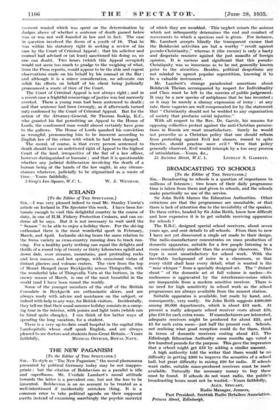BROADCASTING TO SCHOOLS
[To the Editor of THE SPECTATOR.]
SIR,—Broadcasting to schools' is a question of importance to millions of listeners ; two hours of their daily programme time is taken from them and gii,en to schools, and the schools make practically no use of the service.
Sir John Reith blames the Education Authorities. Other criticisms are that the programmes are unsuitable, or that there is lack of attention due to the invisibility of the speaker. Do these critics, headed by Sir. John Reith, know how difficult and how expensive it is to get suitable receiving apparatus for schools ?
The B.B.C, designed special school receivers, about seven years ago, and sent details to all schools. From then to now I have not yet discovered a single set made to their design. The radio-manufacturer concentrates on mass production of domestic apparatus; suitable for a few people listening in a room considerably smaller than the average classroom. This type is most unsatisfactory for school work. With the inevitable background of noise in a classroom, so that every child shall hear every detail, what is wanted is the " near whisper " from a specially designed set. The " distant shout " of the domestic set at full volume is useless—its uselessness is aggravated by the interference-noises which are inseparable from a modem sensitive receiver. There is no need for high sensitivity in school work as the school programmes are always available from the nearest station.
Suitable apparatus is available, but made by hand, and, consequently, very costly. Sir John Reith suggests £400,000 among 30,000 departments, which is about £13 each. At present a really adequate school receiver costs about £50, plus £10 for each extra room. If manufacturers are interested, adequate receivers might be produced for about £25, and £5 for each extra room—just half the present cost. Schools, not realizing what good reception could do for them, think in terms of domestic receivers costing about £15. The Edinburgh. Education Authority some months ago voted a few hundred pounds for the purpose. This gave the impression that a school might get £10 by adding a similar amount.
A high authority told the writer that there would he. no difficulty in getting £300 to improve the acoustics of a school hall, but great difficulty in raising £80 for radio. If schools want radio, suitable mass-produced receivers must be made available. Naturally the necessary money to buy these must be found. If sChools do not want radio, the public's broadcasting hours must not be wasted.—Yours faithfully, At:Ek. STEtwit,
Radio Manager,-Jenners,
Past President, Seettinh Radioltefailers`Assoeiation. Princes Street, Edinburgh.






































 Previous page
Previous page